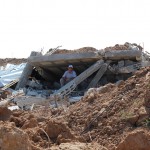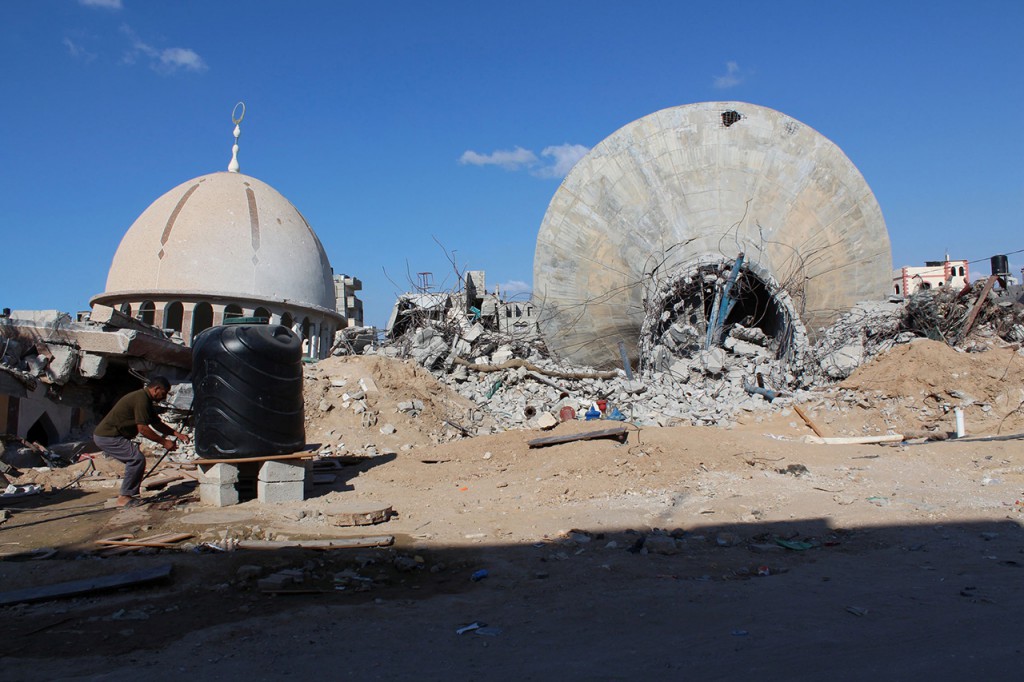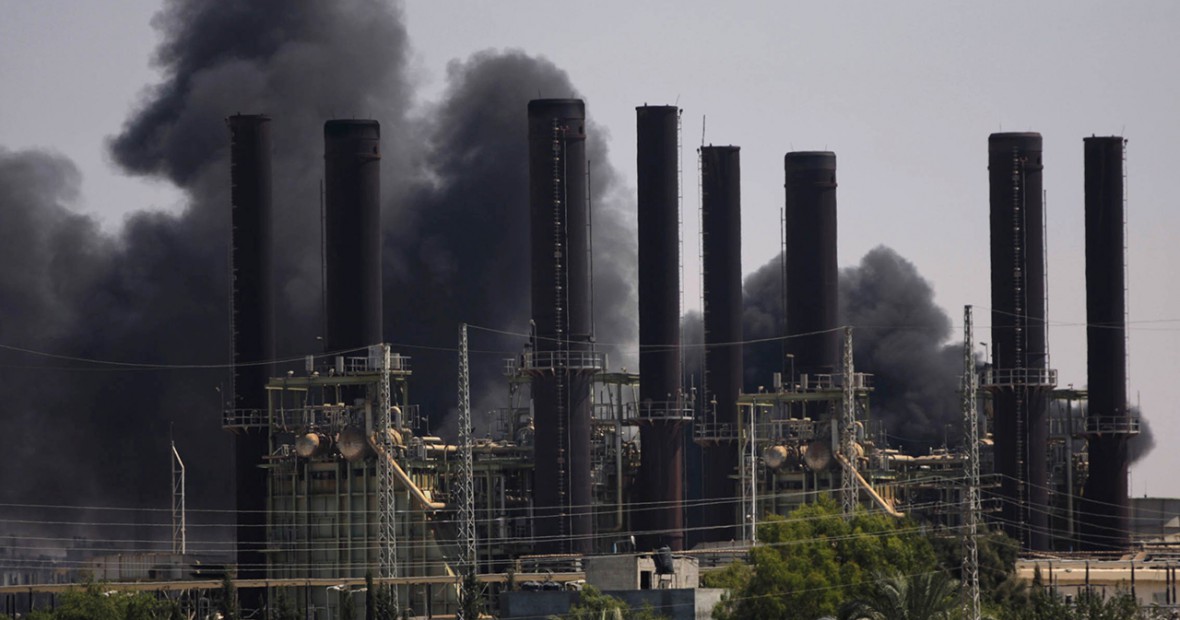Large segments of the population of the Gaza Strip are still deprived of safe drinking water. Repairs to destroyed sewage systems, and the restoration of basic electricity services remain urgent.
Water, sanitation and power structures were already at breaking point before the recent conflict, which further damaged the sewage network as well as the Gaza Power Plant.
Destroyed sewage systems flooded waste water into the clean water networks and the natural environment, worsening the risks to public health. This compounded the fact that the Strip was already discharging 98,000 m3 of waster water a day into the sea.
ICRC’s emergency water and sanitation efforts have so far provided water to over 600,000 people – at least one third of the population of the Gaza Strip- and helped restore over 80% of the limited electricity service for inhabitants of the Strip. A more sustainable rehabilitation of vital infrastructure is however needed.
The vital water-electricty equation

A man sits where his home once stood in Beit Hanoun. During the crisis, tens of thousands of people were forced to flee and thousands of houses and other structures were entirely or partially destroyed. Since the beginning of the conflict the ICRC has provided over 130,000 people with shelter, bedding, hygiene kits, cooking equipment and food rations. @Marco Yuri Jiménez/ICRC 2014
“The equation is simple,” says Guillaume Pierrehumbert, ICRC Water and Habitat Coordinator. “The shortage of electricity prevents water from being cleaned, evacuated, treated, desalinated and restored to homes, hospitals and businesses. There is an overall lack of water and the water that is available is salty, dirty or dangerous to drink.”
Generators are therefore needed as a back-up to perform simple daily activities. These require extra fuel – a scarce commodity in Gaza for a population with little financial capacity.
“Just imagine how the water system in this densely-populated urban area has been maimed,” says Mr Pierrehumbert. “The effects are seen, smelled and felt everywhere, but are most worrying in hospitals where the safety of people in particular need is still jeopardised”.
Critical services are still at risk
Some critical services in hospitals require a permanent power supply which can only be provided by fuel-hungry generators. In addition, water quality, particularly high salinity, is adversely affecting services such as haemodialysis which depend on pure water.
Great challenges persist. Areas such as Beit Hanoun (40,000 inhabitants) and Shujaya (35,000 inhabitants) are still affected by the health risks and strong stench of destroyed sewage systems. It is estimated that more than a year will be needed to restore the situation to pre-war levels.
“Rehabilitation of basic infrastructure is urgent and requires an effective coordination of human effort and material resources,” explained Jacques de Maio, ICRC’s head of delegation in Israel and the occupied territories. “Speeding up the import of materials is vital given the depleted stocks of crucial equipment and spare parts. Risks to public health must not be taken in one of the world’s most densely populated areas,” he concluded.
From the outset of the conflict the ICRC has been closely working with the Coastal Municipalities Water Utility (CMWU), the Palestinian Water Authority (PWA), the Gaza Electricity Distribution Company (GEDCo), the Palestinian Energy and Natural Resources Authority (PENRA) and the municipalities of the Strip, addressing the most urgent repairs to the water systems and electric network.

A Palestinian man takes water from a water-tank in Khuza’a, one of the most damaged areas in the Gaza Strip. The repair of water networks to reestablish access to safe water is crucial. ICRC has so far ensured access to water for over 600,000 people – over one third of the population of Gaza.
@Marco Yuri Jiménez/ICRC 2014
Life-saving efforts ongoing
Since the beginning of the crisis, in continued cooperation with the Palestinian Red Crescent Society the ICRC has also:
- Implemented life-saving activities such as the transport of 3,000 blood units to Gaza and the referrals of patients for treatment outside the Gaza strip.
- Provided emergency repairs and equipment, surgical materials, drugs, medicines and war wounded kits to hospitals and health care structures, ambulance services and to the Gaza Artificial Limb and Polio centre.
- Provided medical personnel, physical rehabilitation and mental health expertise.
- Started repairs in four of the most damaged hospitals in the Gaza strip.
Assisted over 131,000 people displaced by the conflict with items such as shelter, bedding, cooking equipment, hygiene kits, diapers, buckets, jerrycans, cleaning products, and food rations and, in some cases, water and food. This work is on-going.
- Documented cases related to the conduct of the hostilities in and around the Gaza Strip and continued with its bilateral and confidential dialogue with the parties to the conflict.
- Continued to visit and assist detainees and places of detention throughout the conflict.
- Pursued 68 tracing requests pertaining to individuals from Gaza.
- Delivered over 1000 family messages to detainees from Gaza.
In partnership with the PRCS in Gaza, the ICRC:
- Donated 100 body bags and 100 protective uniforms and human remains management sets.
- Facilitated the continuation of hospital work by providing 100,000L of fuel.
- Delivered 1,802 palettes of water, food, hygiene, and ambulance spare parts.


